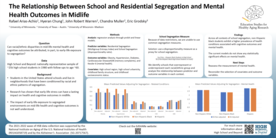Below are upcoming research presentations using EdSHARe survey data from High School & Beyond and/or the National Longitudinal Study of the High School Class of 1972. EdSHARe principal investigators, postdoctoral scholars, graduate students and staff, and other researchers with access to the HS&B and/or NLS-72 data regularly present their findings at conferences and other academic gatherings. The listings below contain a brief overview of the topic and information on where and how to view the presentation.
Presentations
College Expectations of Teachers and Degree Attainment of Students
This research seeks to answer two questions: 1) are students with all their teachers expecting them to attend college more likely to complete 4-year degrees? and 2) Is the association stronger for students with more teachers expecting them to attend college? We use the nationally representative High School and Beyond sample data to assess the…
Intergenerational Occupational Mobility and Health in the United States
Does intergenerational socieconomic mobility—that is, achieving an adult socioeconomic position that exceeds or falls short of one’s parents—impact health and well-being? Do mobility effects matter net of socioeconomic origins and destinations? Are any such effects homogenous across demographic subgroups? Using nationally representative U.S.
Secondary School Quality and Midlife Cognition: Evidence from High School and Beyond
Research on the association between education and later-life cognitive outcomes usually
only considers the quantity of schooling that people complete. However, people with the same level of completed schooling are highly diverse with respect to the quality of schooling they experienced. Using a unique new data resource, we ask how…
The Contribution of School Quality to Stroke and Cardiovascular Disease Risk in the U.S. Stroke Belt
Stroke and cardiovascular disease (CVD) are important risk factors for later life dementia. In the United States the geographical distribution of high stroke risk, known as the U.S. Stroke Belt, is an important contributor to race and SES-based gradients in not only CVD but dementia as well. In this study we examine the impact that schools have…
High School and Beyond: New Cohort Data for Studying the Social and Biological Pathways through which Education Shapes Midlife Cognition
The purpose of this presentation is to describe the utility of the High School and Beyond (HSB) cohort for studying the impact of early life circumstances and experiences-- especially education-- on risk of midlife cognitive impairment. This nationally representative cohort has provided 40+ years of prospective data on a variety of topics.
School Quality and Health at Midlife: Evidence from High School and Beyond
Research on the association between education and later-life cognitive outcomes usually only considers the quantity of schooling that people complete. However, people with the same level of completed schooling are highly diverse with respect to the quality of schooling they experienced. Using a unique new data resource, we ask how secondary…
Intergenerational Mobility and Health in the United States
We examine (1) the effects of intergenerational occupational mobility on later-life physical and mental health and (2) how these effects vary by gender and race. While the effects of socioeconomic status on health are extensively investigated, we know much less about how individuals’ experience of mobility shapes long-term health outcomes.
Education and the Social Stratification of Pain at Midlife
Chronic pain is an alarming and consequential health issue of global relevance, whose burden is, however, unevenly distributed across society. Existing studies stratify respondents by their level of education, but the relationship between education and pain may be confounded by socioeconomic background and knowledge accumulation. Using…
Late-Life Science Knowledge and Association With Risk of COVID-19 Infection and Probability of COVID-19 Vaccination
We investigate the degree to which science knowledge—familiarity with basic scientific facts—is related to risk of COVID infection and vaccination. Using data from the High School & Beyond (HS&B) cohort study, we address this issue and consider the degree to which science knowledge accounts for social gradients in infection and…
The Relationship Between School and Residential Segregation and Mental Health Outcomes in Midlife
There is emerging interest in the relationship between residential and school segregation and racial and ethnic health disparities. Much of the current research looks at physical health outcomes, health behaviors, and healthcare access. However, The relationship between residential and school segregation and mental health is still…









